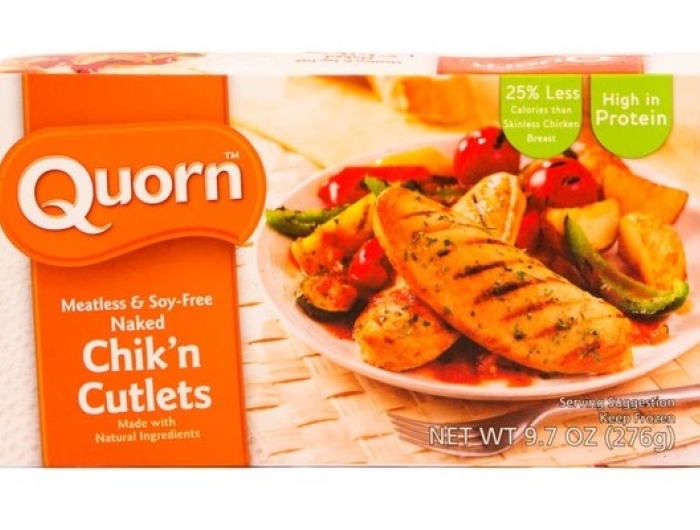Quorn products linked to severe vomiting

Food-safety group calls for ban on mould-based meat substitute
A prominent U.S. consumer group has urged the United Kingdom’s Food Standards Agency (FSA) to review the safety of—and then ban the sale of—the fake meat made from fungus that is sold under the brand name Quorn. The group, the Centre for Science in the Public Interest, has received more than 130 complaints from British and American consumers who became ill after eating a Quorn food.
Quorn is the brand name for a line of foods made with so-called “mycoprotein.” That ingredient springs from a single-celled fungus grown in large fermentation vats by North Yorkshire-based Marlow Foods, a division of the pharmaceutical giant AstraZeneca.
Today, the Centre asked FSA chairman Sir John Krebs to review new documents pertaining to Quorn’s safety and to launch a thorough investigation into reports that people who experienced adverse reactions to Quorn have sent to Marlow Foods or to a CSPI website, www.QuornComplaints.com. CSPI advertised that website in one small newspaper advertisement last Saturday. CSPI similarly urged European Commission food-safety authorities to investigate Quorn.
“It is clear that many people are suffering severe symptoms, including bouts of repeated vomiting, bloody vomiting, and diarrhoea,” said CSPI executive director Michael F. Jacobson. “One woman experienced fecal incontinence in public places, while another feared choking to death on her vomit. People have told us that they fainted in the Underground and on the toilet, vomited out the window of a taxi, and missed work, Christmas dinners, concerts and other activities.”
Louise Morrice, a 35-year-old resident of Sussex, suffered several bouts of vomiting and diarrhoea until she recognized that Quorn was the culprit. In the most recent and serious episode, she vomited repeatedly and fainted.
Nick Tume, a 24-year-old London resident, three times suffered severe vomiting after eating Quorn foods. On one occasion he was forced to miss a day of work.
Earlier this year, CSPI filed complaints with British and American authorities about the labelling and advertising of Quorn products. Quorn’s packaging uses words like “mushroom protein” to describe mycoprotein. According to fungus experts, Quorn’s fungus is only distantly related to mushrooms—as distantly as a fish is to a human. They say Quorn’s fungus is actually a mould.
Since then, the British Mushroom Bureau and the American Mushroom Institute have complained about Marlow Foods’ attempts to link Quorn with mushrooms. The North Yorkshire Trading Standards Office recently directed Marlow Foods to suspend its use of the term “mushroom protein” in Quorn advertisements.
Concerns about Quorn’s labelling and advertising, though, have taken a back seat to concerns about the products’ safety, especially after documents obtained by CSPI indicate that more people have adverse reactions to Quorn than Marlow Foods had previously admitted. One key study, filed by Marlow Foods with U.S. food authorities, found that as many as 10 percent of 200 volunteers experienced vomiting, nausea, or stomach aches after eating Quorn’s mycoprotein, compared with 5 percent in a 100-volunteer control group. Marlow Foods claims publicly that no more than one in 146,000 consumers would have an adverse reaction.
“The Food Standards Agency should take action against an ingredient that makes so many people sick,” Jacobson said. “I am surprised that any manufacturer or grocer would risk sullying its reputation by selling sickness-inducing foods.”
“On theoretical grounds alone, the use of this mould in food is highly dubious,” said Dr. John Santilli, an American allergist.
“The data argue compellingly that the mycoprotein is almost certainly gastrotoxic,” said Dr. David A. Morowitz, a clinical professor of gastroenterology at Georgetown University in Washington.
Earlier this week, CSPI called for a recall of Quorn products in the United States. CSPI asks that consumers who felt sick after eating Quorn file confidential reports at www.QuornComplaints.com or by writing the Centre at BCM Box 296, London WC1N 3XX.
Topics
Brands

